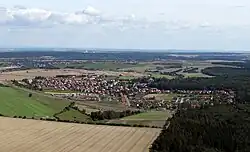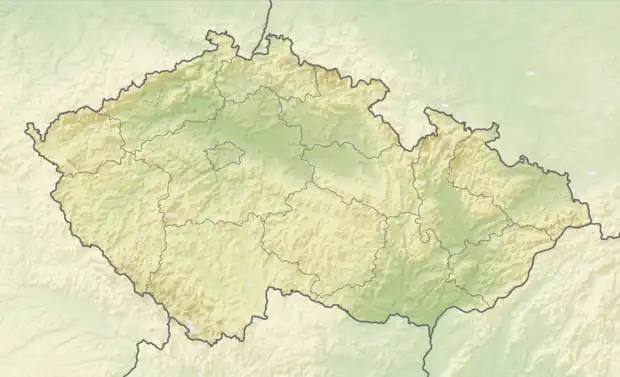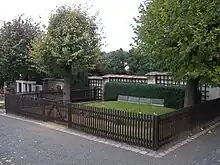Lány (Kladno District)
Lány is a municipality and village in Kladno District in the Central Bohemian Region of the Czech Republic. It has about 2,300 inhabitants. The main landmark is the Lány Castle, known as the residence of the Czech and Czechoslovak presidents. Tomáš Garrigue Masaryk, the first President of Czechoslovakia, lived here and is buried in Lány cemetery.
Lány | |
|---|---|
 Aerial view | |
 Flag  Coat of arms | |
 Lány Location in the Czech Republic | |
| Coordinates: 50°7′23″N 13°57′2″E | |
| Country | |
| Region | Central Bohemian |
| District | Kladno |
| First mention | 1392 |
| Area | |
| • Total | 33.97 km2 (13.12 sq mi) |
| Elevation | 421 m (1,381 ft) |
| Population (2023-01-01)[1] | |
| • Total | 2,260 |
| • Density | 67/km2 (170/sq mi) |
| Time zone | UTC+1 (CET) |
| • Summer (DST) | UTC+2 (CEST) |
| Postal code | 270 61 |
| Website | www |
Administrative parts
The village of Vašírov is an administrative part of Lány.
Etymology
The word lány means in Czech "fields" or "tracts (of land)".
Geography
Lány lies about 9 kilometres (6 mi) west of Kladno and 35 km (22 mi) west of Prague. Most of the municipality is located in the Křivoklát Highlands and in the Křivoklátsko Protected Landscape Area. The highest point is at 465 m (1,526 ft) above sea level.
History
The first written mention of Lány is from 1392, when there was a wooden fortress. The village often changed owners. From 1581 it was property of Jiřík Bořita Martinic. He sold it to Emperor Rudolf II in 1589. He had replaced the fortress with a Renaissance hunting lodge.[2][3]
Until 1658, Lány was property of the royal chamber, then it was purchased by the House of Schwarzenberg. They merged Lány with the Křivoklát estate. The Waldstein family bought the estate at the end of the 17th century. After Marie Anna of Waldstein married Prince Joseph Wilhelm Fürstenberg, the estate fell to the Fürstenberg family, which held Lány until 1921.[2][3]
The second oldest horse-drawn iron wagonway in continental Europe operated between Prague and Lány (originally planned to reach Plzeň) from 1831 until 1869. Its final station was in present-day forester's lodge of Píně.[4]
Demographics
|
|
| ||||||||||||||||||||||||||||||||||||||||||||||||||||||
| Source: Censuses[5][6] | ||||||||||||||||||||||||||||||||||||||||||||||||||||||||
Transport
Lány is served by the railway station in Stochov, close to the municipal border.
Sights

The major landmark of Lány is Lány Castle. At the end of the 16th century, the local fortress was rebuilt into a Renaissance hunting lodge. It was rebuilt into a Baroque castle in the 17th century. Another floor was added in 1730. The game park in the woods near the castle was established in 1713 and the large castle park was founded in 1770. The castle acquired its current appearance after a major reconstruction in 1902–1903. In 1921, it was purchased by the Czechoslovak state and designated as an official summer presidential residence. Slovene architect Jože Plečnik reconstructed the castle and its park in 1921–1924. T. G. Masaryk liked the castle and was allowed to stay there after his abdication in 1935 until his death in 1937. During World War II, the castle was a residence of Emil Hácha, President of Protectorate of Bohemia and Moravia, then it was used sporadically.
After the Velvet Revolution, the tradition was revived by Václav Havel, the first president of the Czech Republic. Since then, it has been a place of many official sessions between the president and other top politicians. The castle itself is closed to the public. The castle park is partially accessible.[3]
The Church of the Holy Name of Jesus was originally built as a castle chapel. It was built in the Rococo style in 1748–1752 and it is connected to the castle by a covered passage.[7]
A reconstructed Baroque building of a former granary houses the Museum of T. G. Masaryk. The museum presents the life and living of the entire Masaryk family, the period of the World War I, the Czechoslovak Legion and the establishment of the First Czechoslovak Republic. There is also a small exhibition about the municipality.[8]
The Masaryk family tomb is located in the local cemetery, where, in addition to Tomáš and Charlotte, their children Jan and Alice are also buried. The tomb has become a symbol of Czechoslovak democracy, especially in the era of Czechoslovak Socialist Republic.[3] The tomb of Tomáš Garrigue Masaryk is protected as a national cultural monument.[9]
The Ice Hockey Hall of Fame is a small museum devoted to the history of Czech and Czechoslovak ice hockey. It contains a collection of jerseys, ice hockey sticks, photos, pieces of equipment, publications, and medals.[10]
Notable people
- Charlotte Garrigue Masaryk (1850–1923), First Lady of Czechoslovakia; lived here, died here and is buried here
- Tomáš Garrigue Masaryk (1850–1937), first President of Czechoslovakia; lived here, died here and is buried here
- Zdeněk Nedvěd (born 1975), ice hockey player
Gallery
 Masarykovo Square
Masarykovo Square Horse stable of the castle
Horse stable of the castle Tomb of the Masaryk family
Tomb of the Masaryk family The village of Vašírov
The village of Vašírov
References
- "Population of Municipalities – 1 January 2023". Czech Statistical Office. 2023-05-23.
- "Obec Lány" (in Czech). Obec Lány. Retrieved 2023-04-05.
- "The Lány Chateau". Prague Castle. Retrieved 2023-04-05.
- "Koněspřežka se "hadila" z Prahy do křivoklátských lesů. Tam došly peníze" (in Czech). iDnes. 2017-08-16. Retrieved 2023-04-05.
- "Historický lexikon obcí České republiky 1869–2011 – Okres Kladno" (in Czech). Czech Statistical Office. 2015-12-21. pp. 5–6.
- "Population Census 2021: Population by sex". Public Database. Czech Statistical Office. 2021-03-27.
- "Kostel Nejsvětějšího Jména Ježíš" (in Czech). Obec Lány. Retrieved 2023-04-05.
- "Muzeum T. G. Masaryka v Lánech – seznamte se s osobností prvního československého prezidenta" (in Czech). CzechTourism. Retrieved 2023-04-05.
- "Hrobka T. G. Masaryka" (in Czech). National Heritage Institute. Retrieved 2023-04-05.
- "Legendy v Lánech: Pepík Hošek vytvořil unikát!" (in Czech). Deník.cz. 2019-06-06. Retrieved 2023-04-05.